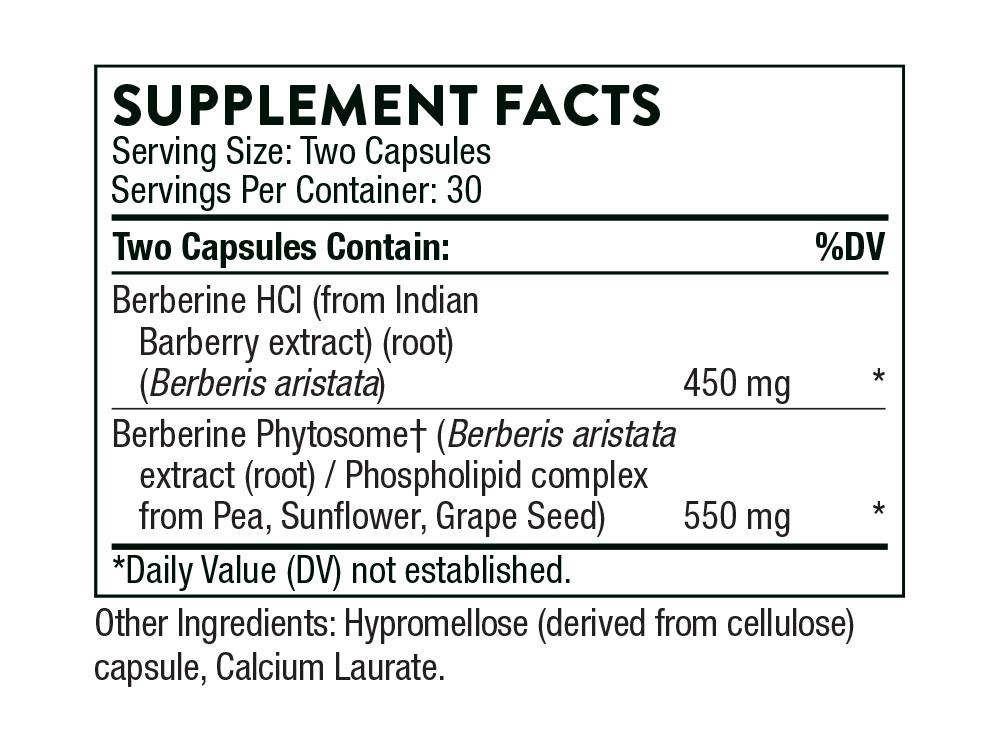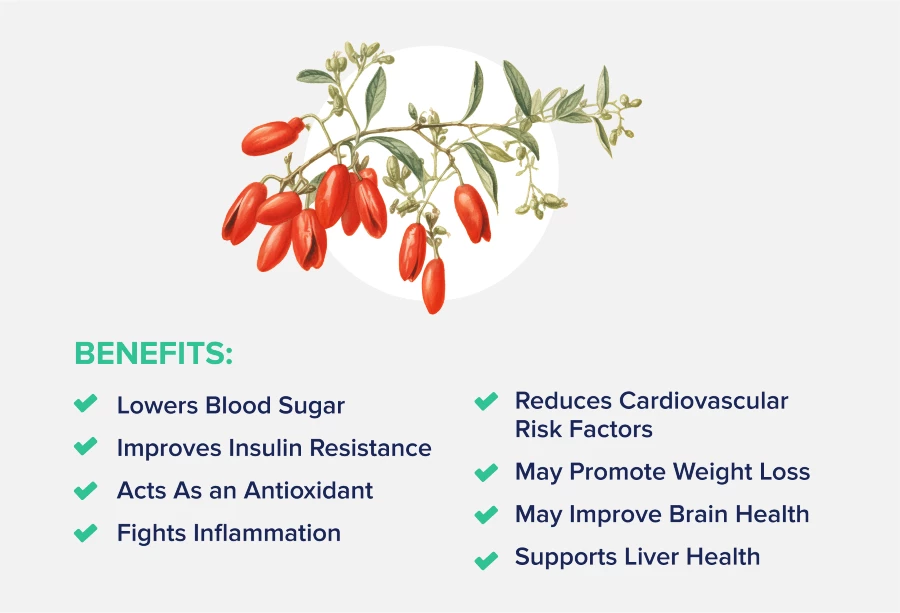Talk to a Registered Dietitian and use INSIDER20 for 20% off!
Talk to a real Dietitian for only $99: Schedule Now
This post contains links through which we may earn a small commission should you make a purchase from a brand. This in no way affects our ability to objectively critique the products and brands we review.
Evidence Based Research To fulfill our commitment to bringing our audience accurate and insightful content, our expert writers and medical reviewers rely on carefully curated research.
Read Our Editorial Policy
As of 2025, berberine is a popular way to manage blood sugar and metabolic function. In fact, people have dubbed it “nature’s Ozempic,” which is a blood glucose management medication that is now also being overly prescribed for weight loss.
While it doesn’t have quite the same weight loss-inducing effects as Ozempic, berberine has been shown to be a natural way to support blood sugar management. This has led many to search for the best berberine supplements on the market.
We also enlisted the help of our in-house Registered Dietitian, Cambria Glosz, MS, RD, who reviewed the ingredients and formulations of each berberine supplement to back up our choices.
Get one-on-one carb coaching to flatten post-meal spikes.
Get one-on-one carb coaching to flatten post-meal spikes.

The Nutrition Insider prides itself on being a neutral third party that only reviews products we believe in. Our team consists of doctors, registered dietitians, and food experts dedicated to providing you with the best science-backed takes on the latest food and nutrition trends and health products. Our content dives deeper than surface-level branding and marketing claims, providing you with value-added “industry insider” information. For more information about how The Nutrition Insider conducts its reviews and other aspects of our business, please feel free to read our Editorial Policy.
At 1200mg per serving, HUM Nutrition Best of Berberine offers the highest dose of berberine per two-capsule serving on this list.
According to HUM, 1200 milligrams is the most clinically effective dose for lowering blood sugar, supporting gut health, and maintaining a healthy body weight, as verified by looking at 77 clinical studies.
You won’t find any unwanted fillers in this supplement, as it just contains berberine, Bioperine (to boost absorption rates), and hypromellose for the capsule (which is a form of vegetarian cellulose).
This berberine supplement might not be for everyone, as these higher doses are more likely to cause digestive-related side effects when taken all at once.
However, it may be a good choice for people who don’t want to take three split-up doses throughout the day, as this supplement recommends only taking it once per day with food.
At $35 for 30 servings ($1.17/serving), this is one of the pricier berberine supplements. However, it has triple the dosage of most of the others.
HUM triple-tests their products with third-party labs for purity and quality and is certified by the Clean Label Project.
Their products are also formulated by Registered Dietitians, and this berberine supplement is vegan, gluten-free, non-GMO, and produced in a GMP-certified facility.
PartiQlar Pure Berberine HCL is a great choice for those looking for an affordable, bioavailable berberine in a moderate dose.
PartiQlar Pure Berberine HCL provides 600mg per one-capsule serving, which is a middle-of-the-road dose that is not likely to cause digestive issues, and HCl (hydrochloric acid) is added to aid absorption.
Compared to berberine alone, the addition of hydrochloric acid has been found to improve its absorption. This is because hydrochloride salt can increase the solubility and stability of berberine, making it more readily absorbed by the body.
This supplement also does not contain unnecessary or unwanted fillers—it solely contains a vegetarian cellulose capsule.
Although it’s already affordable with a one-time purchase ($25.99 per bottle or $0.43 per serving), PartiQlar also offers a steep discount when you buy six bottles (bumping it down to just $0.26 per serving and a one-year supply).
If you know you’re going to be taking berberine long-term, this is a great deal.
PartiQlar Berberine is third-party tested for purity and provides their quality reports readily available on the site.
It is also non-GMO, vegan, produced in GMP-certified facilities in the U.S., and is NSF Certified.
Thorne Berberine is an excellent berberine supplement choice, with a high dose in each serving (1,000mg) and elevated bioavailability—however, it’s pretty pricey compared to other berberine supplements.
Thorne Berberine contains 450mg of berberine HCl with 550mg of a berberine phytosome with a phospholipid complex that enhances its bioavailability.
Grape seed extract in the phytosome also protects the gastrointestinal tract, helping to reduce the potential digestive side effects of berberine.
They also note that their berberine is sourced from non-endangered species.

At $40 for 30 servings ($1.33/serving), Thorne is one of the most expensive berberine supplements.
Thorne has a handful of certifications, including:
However, they don’t have additional certifications like Non-GMO Project Verified or Certified Vegan.
They also have an extensive “No List” of ingredients they will never add to their products, ranging from the top food allergens and high-fructose corn syrup to preservatives and artificial sweeteners.
Thorne products undergo four rounds of extensive testing, including testing raw materials for contaminants when they come in, in-process and finished product testing for purity, identity, and potency, and stability testing to confirm their label claims.
While all berberine supplements are technically beneficial for lowering blood sugar, 1st Phorm GDA has additional supportive ingredients for doing so—and the name says it all, as GDA stands for “Glucose Disposal Agent.”
1st Phorm FDA contains several nutrients and compounds above and beyond berberine.
These extra nutrients and compounds include chromium, banaba leaf extract, vanadyl sulfate, and cinnamon, all of which have been studied for their role in reducing blood sugar or insulin resistance.
Plus, 1st Phorm GDA contains alpha-lipoic acid and Gymnema sylvestre extract, which may help to support weight loss.
Specifically, Gymnema sylvestre is thought to slow down the absorption of carbohydrates from the intestines into the bloodstream, leading to reduced dietary intake as well as lower blood sugar.
However, one downside is that this supplement is not vegan or vegetarian, as it’s encased in a gelatin capsule.
1st Phorm GDA costs $42.99 for 60 servings, coming out to $0.72 per 2-capsule serving.
Although this supplement is pricier than others, you get the benefit of six additional compounds to support weight loss and blood sugar management, which may make it well worth it for some.
1st Phorm products are third-party tested, and their ingredients have a Certificate of Independent Laboratory Analysis, which verifies that they meet FDA standards for microbial content, heavy metals, solvents, and pesticides.
Their facilities are FDA-inspected, SQF Level-3 certified, and follow cGMP (Current Good Manufacturing Practices).
Best for: People on a budget looking for a high-quality berberine supplement.
At just $0.33 per serving, Solaray Berberine Root Extract Advanced Formula is our top pick for people wanting a berberine supplement on a budget.
With the berberine coming from Indian barberry and Oregon grape (which is actually a shrub and not, in fact, grapes), this berberine supplement is sustainably sourced.
It also contains comparable amounts of berberine to other supplements (535mg per serving) and is third-party tested, vegan, and Non-GMO Project Verified.
For an affordable berberine supplement that doesn’t skimp on quality, Solaray is your best bet.
NOW Berberine Glucose Support is a great option for supporting the absorption and utilization of berberine, as the compound is known to have limited bioavailability on its own.
In addition to 400mg of berberine per capsule, this NOW supplement also contains capric acid and medium-chain triglycerides, which are thought to boost berberine’s bioavailability and lessen any potential digestive symptoms from the compound.
However, this supplement is not vegan or vegetarian, as it contains bovine gelatin and beeswax, as well as caramel coloring in the capsule.
According to the CSPI (Center for Science in the Public Interest), caramel coloring may contain contaminants that cause cancer in male and female mice. While the amount found in these small soft gels is likely negligible, some people understandably wish to avoid such ingredients.
At $39.99 for 90 servings, NOW Berberine is a very reasonable $0.44 per serving.
NOW is one of our trusted brands at The Nutrition Insider, earning an A in our extensive review.
Their products are audited and certified by Intertek GMP Supplement Certification, which means they have met Supplement Safety & Compliance Initiative (SSCI) benchmarks, and do in-house testing for microbes, heavy metals, contaminants, and more.
Berberine works primarily by activating an enzyme called AMP-activated protein kinase (AMPK), which acts like a metabolic master switch that reduces blood sugar and regulates metabolism.
Berberine is most well-known for its ability to reduce blood sugar and insulin resistance, which may reduce the risk of type 2 diabetes.
It may also reduce high cholesterol and lipid levels and support liver function, brain health, and weight loss.
Berberine offers numerous health benefits due to its alkaloid properties that exert antioxidant and anti-inflammatory activity, which translates to several health benefits, including:

Although berberine has plenty of benefits, there are also some potential downsides to be aware of.
Berberine is generally safe in moderate doses—such as 250-500mg, three times per day—but higher or excessive doses may cause side effects.
The most common side effects of berberine are gastrointestinal-related, including gas, bloating, indigestion, diarrhea, or constipation—however, these are often fixed by taking smaller doses or splitting it up between three meals.
As one of the leading benefits of berberine is lowering blood sugar, it can also cause hypoglycemia (too-low blood sugar) in some people.
Berberine has the potential to interact with several medications (especially those for lowering blood sugar), so check with your healthcare provider if you’re unsure.
Lastly, it’s not recommended to take berberine if you are pregnant or breastfeeding.
Although berberine comes from different plants (goldenseal, barberry, Oregon grape, etc.), they aren’t thought to be more or less effective depending on which plant they come from.
However, some supplements may contain additional ingredients to support the absorption and utilization of berberine—like NOW Berberine Glucose Support, which adds medium-chain triglycerides to boost bioavailability.
Most berberine supplements come in doses of 400-500mg per serving and can be taken up to three times per day with meals.
Pregnant or breastfeeding women should not take berberine, and people with diabetes or those taking medications for diabetes will need to speak with their healthcare provider first, as berberine can also lower blood sugar.
The most common side effects of berberine are gastrointestinal, including nausea, gas, diarrhea, or constipation—especially if taken in doses that are too high (more than 500mg at a time).
Berberine and berberine HCl are very similar—the only difference is that berberine is a naturally occurring compound derived from plants like barberry, while berberine HCl is a chemically made supplement that combines berberine with hydrogen chloride, which may make it more stable.